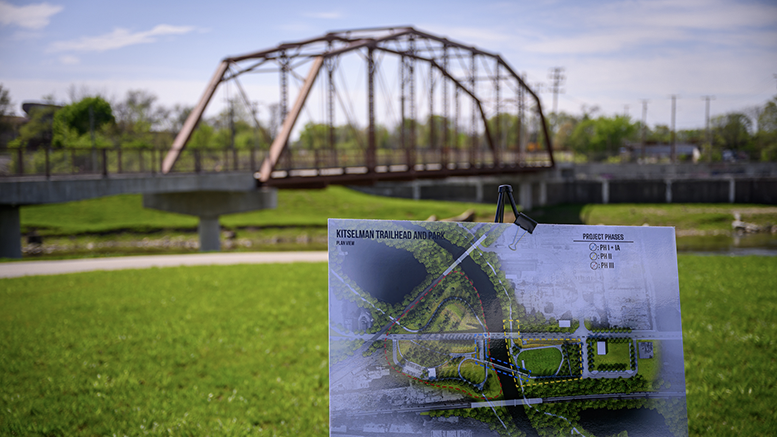By Kyle Johnson, President, Cardinal Greenway Board of Directors—
MUNCIE, IN— Cardinal Greenways is proud to announce the commencement of the third and final phase of the Kitselman Gateway Project, a transformative initiative that completes the critical connection between the Cardinal Greenway and White River Greenway across the White River. This major milestone not only enhances trail connectivity and safety, but also marks a significant moment in the revitalization of Muncie’s post-industrial landscape into a dynamic, inclusive, and beautiful public space.
A Vision Realized: Connecting Trails, Cleaning the Past, Creating a Gateway
At its core, this final phase removes the at-grade trail crossing at East Jackson Street, providing a safe underpass for trail users along both sides of the river and improving access to and from the east side of Muncie. More than a physical link between trails, the Kitselman Trailhead creates a new eastern gateway into Muncie, transforming the legacy of a formerly contaminated and neglected 14-acre industrial site into a space that celebrates the city’s past while welcoming the future.
This project breathes new life into the site of the former Indiana Steel & Wire (IS&W) and Broderick Hammer facilities—massive industrial complexes that once loomed over East Jackson Street. These properties, long burdened with brownfield restrictions and Superfund designations, are now being repurposed in a way that honors their legacy while serving the community.
A Strategic Community Initiative Sparked by Long-Range Vision
The Kitselman Gateway Project was shaped by decades of work by local community members and philanthropic partners who had a vision for the transformation of the site. Recognizing that there was significant potential to reinvest in East Muncie, partners came together in the early 2000s to kickoff efforts with the nearby Craddock Wetland restoration, a vital ecological effort that supports biodiversity and environmental education.
Marjorie Ziegler and the Sherman and Marjorie Ziegler Foundation were strong champions of the adjacent KitselmanTrailhead project along with other philanthropic partners including Ball Brothers Foundation, the George & Frances Ball Foundation, the Edmund F. & Virginia B. Ball Foundation, IU Health Foundation, The Community Foundation of Muncie and Delaware County, and others.
Over time, growing interest also inspired the removal of river dams, reconnecting people to the White River and making recreational access a centerpiece of urban renewal. The early success of the first phases of the Kitselman Trailhead build out proved catalytic, helping to attract the Kitselman Pure Energy Park (KPEP) development—further proof that strategic green space investments spark broader economic growth.
World-Class Design and National Attention
Muncie enlisted LAND COLLECTIVE, a nationally renowned landscape architecture firm, to design a trailhead experience that reflects the city’s heritage and elevates its visibility nationwide. Over the past ten years, the trailhead build-out has been guided by these plans, ensuring that the Kitselman Gateway will be both functionally exceptional and visually iconic.
This area of East Jackson Street sees one of the highest daily traffic counts in Muncie, as it serves commuters from Selma, Parker City, Winchester, and eastern Indiana. Many of these travelers are essential workers supporting Ball State University, IU Health Ball Memorial Hospital, and downtown businesses. The contrast between driving past abandoned industrial buildings and experiencing a welcoming, vibrant green space cannot be overstated.
Honoring the Past with Art and Interpretation
In addition to improved connectivity and landscaping, this final phase of the project will include public art and interpretive signage to tell the story of the site’s industrial past. A signature Muncie art installation, currently in conceptual development, will anchor the trailhead. This artwork is envisioned as a large metal slab “peeled apart”—referencing industrial architecture—with “Ball Blue” glass inlays symbolizing both the Ball Brothers and Hemingray Glass legacies. It will be backlit to glow at night, offering a dramatic and meaningful welcome to all who enter the city from the east.
Three major public art pieces are planned, two of which will reference the city’s wire and manufacturing history. Art installation is expected by 2027 with a committee currently forming to lead the artist selection and fundraising process.
An Infrastructure Investment over Two Decades in the Making
The Kitselman Trailhead is the eastern terminus of the White River Greenway, which stretches west to Marrow’s Meadow in Yorktown, creating a scenic 10-mile riverfront experience. It also serves as a critical junction where the White River Greenway feeds into the Cardinal Greenway, the state’s longest rail-trail. This connection is more than symbolic—it’s essential to the health, mobility, and identity of the region.
A Community Effort with Broad Support
This achievement would not be possible without the support and collaboration of a wide range of partners, including:
- INDOT
- City of Muncie
- Muncie Sanitary District (MSD)
- Delaware County Commissioners
- Ball Brothers Foundation
- George and Frances Ball Foundation
- Ed and Virginia Ball Foundation
- Community Foundation of Muncie and Delaware County
- Sherman and Marjorie Zeigler Foundation
- Community Enhancement Projects
- Indiana Department of Natural Resources (DNR)
- U.S. Fish and Wildlife Service
- Indiana Department of Environmental Management (IDEM)
- Kitselman Pure Energy Park (KPEP)
“The final phase of the Kitselman Gateway Project is more than a construction milestone—it’s the realization of a shared community vision that honors our history, improves quality of life, and strengthens the identity of ourcity for generations to come,” – Kyle Johnson, President of the Cardinal Greenways Board of Directors.
For more information and project updates, please visit CardinalGreenways.org



